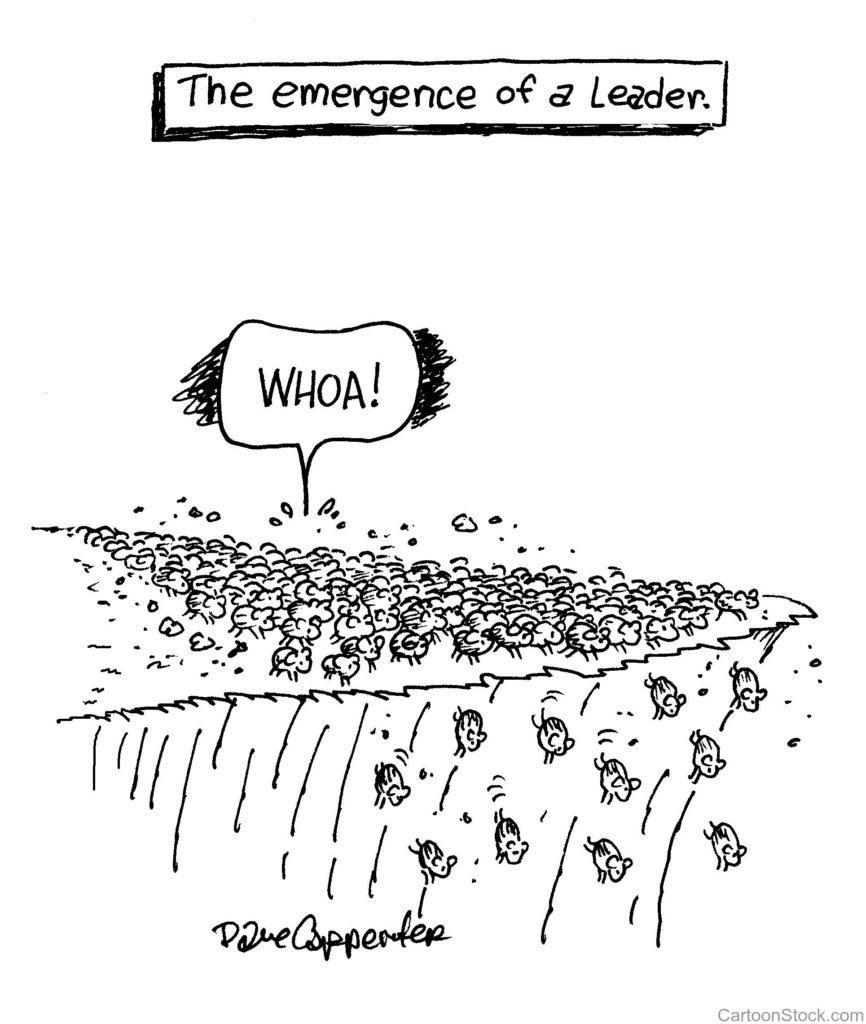 Most organizations are vastly over-managed and desperately under-led. Stephen Covey
Most organizations are vastly over-managed and desperately under-led. Stephen Covey
There’s a difference between a manager and a leader. One role is not more important than the other, they’re just different.
In his book On Becoming a Leader, Warren Bennis draws these distinctions:
- The manager administers; the leader innovates.
- The manager is a copy; the leader is an original.
- The manager maintains; the leader develops.
- The manager focuses on systems and structure; the leader focuses on people.
- The manager relies on control; the leader inspires trust.
- The manager has a short-range view; the leader has a long-range perspective.
- The manager asks how and when; the leader asks what and why.
- The manager has his or her eye always on the bottom line; the leader’s eye is on the horizon.
- The manager imitates; the leader originates.
- The manager accepts the status quo; the leader challenges it.
- The manager is the classic good soldier; the leader is his or her own person.
- The manager does things right; the leader does the right thing.
[From: On Becoming a Leader, Warren Bennis, Basic Books, page 39-40.]
The cumulative effect of this list seems to denigrate managers and extol leaders. But in his book Learning to Lead, Bennis says:
“No organization can function successfully without both roles. The danger, however, is to confuse them, to fail to provide for both and to diminish the potential contribution of each. The difference may be summarized by viewing the activities of leaders as those of vision and judgment – in other words, effectiveness – verses the activities of managers that focus on mastering routines – in other words, efficiency.”
I prefer to use the term “leader” when referring to both roles; there are tactical leaders (managers) and strategic leaders.
Most leadership positions require a combination of both skill sets. In my current position at the church, I “lead” about 30% of the time and “manage” 70% of the time. I am aware of when I’m switching from one role to the other and I try to balance both roles.
Mastering the skills of management is a prerequisite for leading well. Good managers lean the fundamentals of how an organization works, which becomes helpful when crafting credible vision. The opposite approach—becoming a leader with no management skills or experience—usually produces a detached, oblivious leader.
To personalize this essay, respond to these issues.
- Do you agree that there’s a difference between a manager and a leader?
- Is it advantageous to be skilled at both?
- Are you a better manager or a better leader?
- Does your current position require you to manage or a lead?
- Identify a position in your organization that primarily requires management skills.
- Identify a position in your organization that primarily requires leadership skills.
[reminder]What are your thoughts about this essay?[/reminder]

I appreciate the recognition that many leaders have to both manage and lead. If a leader is not skilled at both, which can be difficult, it is important for the leader to surround himself or herself with others who are strong in areas where the leader is weak.
Also, these is misspelled in the line, “respond to these issues.”
Ronny, well said. And, thanks for mentioning the typo.
Don
Dear Don,
It’s taken me a little while to get back to last week’s article even though I recommended it to a friend. You posed some tricky questions.
Do you agree that there’s a difference between a manager and a leader? This will differ according to the type of organisation. In a very controlling environment, particularly where the owners of a business micro manage, the leadership skills of managers might not be appreciated. Some of the descriptions of managers sound more like the roles of administrators.
Is it advantageous to be skilled at both? In many organisations it is essential as a manager who has no long term vision cannot inspire their team to go beyond their current performance.
Are you a better manager or a better leader? Probably a better leader.
Does your current position require you to manage or a lead? I wear a lot of hats and depends on how much autonomy I’m given in the role. I attempt to lead but become frustrated by the length of time it takes for change to happen.
Identify a position in your organization that primarily requires management skills. Deputy Manager roles.
Identify a position in your organization that primarily requires leadership skills. Head Teacher.
Angela,
Once again, I have benefited from reading your thoughts. Thanks for taking the time to write. I like your observation that “administrators” often do the work of a manager.
You think well.
Don